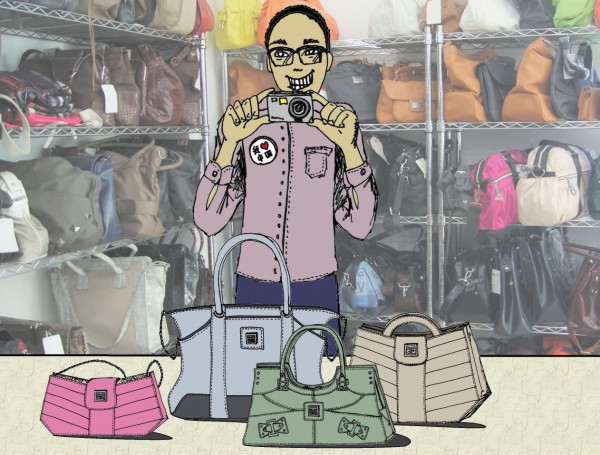
A Chinese businessman tells me offhandedly that he’s under federal investigation. He doesn’t know enough to explain that he’s being investigated for massive amounts of trademark infringement. Those words aren’t in his vocabulary. IP isn’t part of his knowledge set. Instead he says, “You ever heard of Chanel? My factory in China makes Chanel bags. I ship them here and sell in America, in Chinatown. Oh, but my bags are much cheaper than what Chanel sells them for. You want one? You can have it, free. I like you.” He’s beaming with pride. Needless to say, he doesn’t have a license from Chanel to make their bags or use their trademark. Hence the federal investigation.
It’s astounding to me how many manufacturers in China thrive on the business model of copying. They copy designer handbags. They copy electronics, furniture, coffee mugs, medicine, anything that will yield even a penny of profit from copying. And I’ve come to see why. They simply don’t give a rat’s pink hiney about intellectual property rights. It’s not about creativity or establishing one’s own unique brand. It’s not about making your mark in the world. There’s just no respect for any of that. The only thing the Chinese value is money. And until China can educate its entrepreneurs to think differently, to value creativity and intellectual property, it won’t become a world superpower. It just won’t. Because they won’t be intellectual enough to make it.
Once while I was visiting factories in China, a factory owner whipped out samples of next season’s collection from a very well-known French designer and showed them to me. I didn’t ask him to. He did it to boast about his factory, to brag about landing a contract with a big name designer. But I was aghast. I shouldn’t be looking at these designs! These should still be secret until they’re presented to the public next season. I’m technically a competitor! He went on and on revealing all sorts of trade secrets about that French designer, who is one of his paying clients. Unbelievable!
There just isn’t any sense of respect or value placed on intellectual property. The owner didn’t think he was doing anything wrong by showing me the collection because the concept of IP doesn’t register with him. He smiled and pointed at the designer’s bags. “We can make these bags for you, too. Promise you, they will sell very well. And we’ll give you a good deal on the purchase order. Instead of [the French designer’s] logo, we can put yours on.”
WTF?
“They’re in France. You’re in the U.S. Oh, it’s fine!” he tells me. Meanwhile my eyeballs are popping out of their sockets.
I tried explaining to the factory owner that designers value their own work. We pursue designs that are the product of our own creativity, sprung from our own sources of inspiration. Pride comes from other people’s acknowledgment and acceptance of these designs we have conceived, inspirations that are all our own. Pride doesn’t come from the net profit.
And as for trademarks, it’s about pushing yourself to cultivate a brand that is recognizable, that stands for something special, something that is also a reflection of you. Entrepreneurship is about coming up with a business model or mission that is distinct from what’s already out there, and to protect your brand via trademark, so when consumers see the mark, they know it’s you. Why would you want somebody else’s identity, someone else’s brand? Or am I just so full of hubris that I love being me too much? Because nowhere in my mind would I ever process the notion that I should copy somebody else’s design. I want to create my own. And I want to succeed on the merits of my own creativity.
It’s true, unintentional copying happens. It’s the way our brain absorbs information subconsciously and we dupe ourselves into believing it’s our own idea. Or it really is our own idea, but somebody else thought of it too, and they got it registered before we did. I’m not talking about that kind of infringement here. I’m talking about the guy who “makes Chanel handbags,” the designer who would have the effrontery to copy a French designer’s upcoming collection and slap her own logo on it. That’s the kind of intentional infringement that is so commonplace among the Chinese. That’s the kind of infringement that disgusts me.
Sure, America built itself by copying Europe. We were terribly guilty of copyright, trademark, and patent infringement during the Industrial Age. Yet from that heritage of copying, we finally found our own voice. Then up rose the creative class. American society as a whole came to respect IP jurisprudence, right down to the layman. Even your average Joe Plumber has some rudimentary grasp of intellectual property and why it’s important. Your average Joe Chingchong? Not yet.
I’m not saying that it won’t happen to China, that it won’t someday find its own voice. I’m just saying that until it does, China won’t earn the respect it craves from the world. (And boy do they crave it.) Creativity is the highest form of intellectualism. And I’m holding my breath for the day the Chinese recognize that.
[Details, brand names, and such changed to protect the Chinamen referenced herein. In fact, this is a work of fiction. For reals. Any resemblance to actual persons, Chinese or otherwise, is purely coincidental.]








